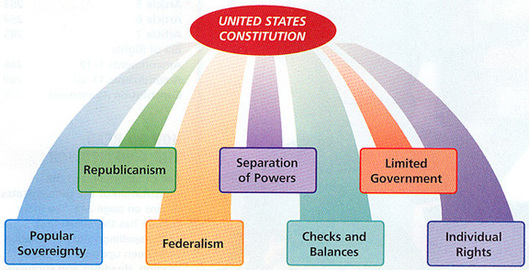6 Principles

Judicial Review: Jefferson tried to give the rights to the states in the Kentucky resolutions, but his cousin, John Marshall of the Supreme Court, proposed which gave the Supreme Court the power to decide if a law is or is not constitutional. Accepted as a result of the famous case of Marbury v. Madison.
Federalism: A government system that has created a national and central government and has distributed law-making powers, the federal government, and local or regional governments that distributed specific legislative powers.
Checks and Balances: A system that ensured that no particular branch of government gained too much power over another. It demonstrated the fear of absolute power in one group/individual as well as preventing one branch from overpowering the others.
Presidents are allowed to serve 7-years terms and elected by the people. To be a president, one must be a Muslim; however Islam is not considered a state religion. The president can name ministers within the government and declare states of emergency or war.
Separation of Powers: A system that separated the powers of government into three separate braches to limit arbitrary excesses by the government. It led to the system of checks and balances so that the government would not become centered on one branch.
Syria considers itself a republic. It consists of a legislative, executive, and judicial branch of government. The legislative branch is considered a dictatorship by many outsiders because it is governed by the People's Council. The executive branch consists of a president, a prime minister, a cabinet, and two vice presidents. The judicial branch includes the High Judicial Council, the State Courts, and the Supreme Court. The Islamic Law is mainly and strictly followed by the judicial system. There are also three different court levels in Syria: courts of appeals, the courts of first instance, and the highest court is the constitutional court.
Popular Sovereignty: Popular sovereignty is the principle that the authority of the government is created and sustained by the consent of its people, through their elected representatives (Rule by the People), who are the source of all political power.
In Syria, the internet censorship is extensive. In Syria, they ban websites for different political reasons and arrest them. Once arrested, the government can look at their internet history. Blocking and filtering your computer was found to be "pervasive". The internet connection between the outside world and Syria in November of 2011 and in May 2013. In 2013, it was cut off more then ten times, and again in March 2014. Instead of taking responsibility for the internet being cut off, the Syrian government blamed different terrorists for the cut off.
No comments:
Post a Comment